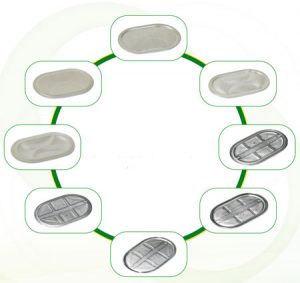Knowledge about Precision Cold Forging Technology
Precision cold forging technology is a method of forming and processing metal materials using a cold forging process. In this technique, the material is forged at room temperature instead of heating the material as in traditional heating forging. With the continuous improvement of industrial technology and demand, precision cold forging technology has gradually become one of the hot topics in metal forming processing. Precision cold forging technology is widely used in aerospace, automotive, medical, etc due to its high efficiency and precision.
The Principle of Precision Cold Forging Technology
- Stress deformation: In the cold forging process, the metal material is placed on the forging anvil. Then a certain force is used to press and impact the material to cause plastic deformation. During this process, the internal structure of the metal changes on a microscopic level, allowing the shape and size of the material to be well controlled.
- Plastic deformation: During the cold forging process, the metal material undergoes plastic deformation due to the action of external force. The material can be accurately shaped and sized by selecting the appropriate forging die shape and process parameters without damaging its structure and properties.
- Cold deformation and material strengthening: In the process of cold forging, the metal material will undergo cold deformation. That is, it is forced to undergo plastic deformation at room temperature. This cold deformation causes grain boundary movement and plastic deformation in the material, thereby enhancing the strength and hardness of the material.
Keys of Precision Cold Forging Technology
- Die design and manufacturing
Precision cold forging technology has high die design and manufacturingrequirements. It is necessary to consider the product’s complex shape and high-precision requirements, reasonably design the mold structure, and select high-precision machining equipment to manufacture the mold.
- Process parameter control
The control of precision cold forging process parameters directly affects the forming quality of the product. It is necessary to control the forging speed, temperature, pressure, and other parameters to ensure metal materials’ forming accuracy and strength.
- Selection and pretreatment of metal materials
Selecting suitable materials is the premise of cold forging technology. It is necessary to select metal materials with high strength and toughness according to the requirements of the product and to pre-treat the materials.
- Die friction and lubrication
In the precision cold forging process, the friction between the die and the metal material greatly influences the forming quality. Selecting a suitable lubricant and lubrication method is necessary to reduce the friction coefficient and improve the forming efficiency and product quality.
Main Functions of Cold Forging Technology
- High accuracy of shape and size
Precision cold forging technology can form and process metal materials with high precision. As the material does not need to be heated during the cold forging process, the influence of thermal deformation and material shrinkage can be avoided. Thereby improving the shape and dimensional accuracy of the finished product.
- Good surface finish
In the cold forging process, the metal material can get a very smooth surface under the action of the forging die. That is because the material is subjected to the pressure and impact of the forging anvil during cold forging. So its surface is fully compacted and plastically deformed.
- Superior mechanical properties
Since precision cold forging technology can introduce cold deformation and material strengthening effects, metal materials’ hardness, strength, and toughness can be significantly improved. That makes cold-forged products have superior mechanical properties and can meet high-strength, high-precision engineering requirements.
- High material utilization
Precision cold forging technology can improve the structure and performance of materials through grain refinement and plastic deformation. This improvement enables the reuse of waste and recycled materials while maintaining a high material utilization rate.
- Energy saving and environmental protection
Compared with traditional heating forging, cold forging technology does not need to heat the material to save a lot of energy and heating equipment. At the same time, since cold forging does not generate high-temperature waste gas and wastewater,it can reduce environmental pollution.

About Heju Stamping-Unique Precision Cold Forging Technology
Dongguan Heju Precision Electronic Technology Co., Ltd. is an enterprise that produces precision stamping parts and has unique advantages in precision cold forging technology.
First of all, stamping parts are formed in the cold state of raw materials. It can avoid problems such as material deformation and thermal cracks and effectively improve the precision and quality of products.
Secondly, it can maintain the material’s original mechanical properties and surface finish while improving the product’s service life. Reducing energy consumption in the production process, and reducing the risk of environmental pollution.
Finally, through close cooperation with customers, the company can carry out personalized customization according to customer’s needs and requirements and quickly respond to market demand changes!
